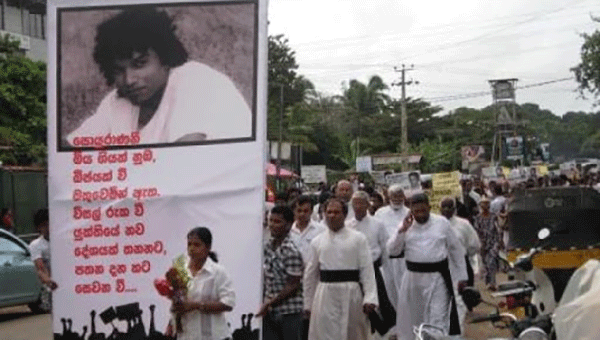Most people of the country do not know who is Roshen Chanaka. Ten years ago, Roshen Chanaka’s name was on everyone’s lips all over the country, but today the people of the country have been forgotten that past. But for free trade zone workers, he is an unforgettable person. That is because Roshen Chanaka (22) was shot dead by the police in a brutal manner during the protest by workers at the Katunayake Free Trade Zone in 2011, against a new pension scheme during the Mahinda Rajapaksa government.
At that time I (the writer) was working as the Minuwangoda Regional Correspondent of Lakbima newspaper. On May 30, 2011, during a protest in the Katunayake Free Trade Zone, the police brutally assaulted and shot workers. Roshen was among the workers who were seriously injured and his last breath on June 1 was due to the heroism of the then Rajapaksa government.
I went to Minuwangoda on Sunday to visit Roshen’s house as he had asked Lakbima for a article regarding Roshen. When I was told that I wanted to get on a three-wheeler from Minuwangoda to Roshen’s house, the three-wheeler driver volunteered to take me there free of charge.
As we walked down Airport Road, we turned left near the cross and walked a short distance to meet Roshen’s house. Roshen’s house at No. 57, New Road, Galloluwa was already crowded, most of them members of the security forces, not Roshen’s friends.
The body had not yet been brought to the half-finished house. Even then, the government was deeply displeased with Roshen’s assassination, and the security forces were keeping a close eye on possible riots against the government.
R.P.A.S. Roshen Chanaka was the fourth of five children of Quintus and Mrs. WD Kanthi. Educated at Burullapitiya MahaVidyalaya, Minuwangoda, he later joined the private sector after completing a Workstudy Garment course at the Ratmalana Youth Services Council. But he only went there one day. According to Ms. Kanthi’s memory, he had refused to do so, saying there were too many girls there.
He later turned to sports and got a job at a white iron factory in Katunayake as his 22-year-old brother was preparing to join Roshen’s brother in a sports club. Roshen’s parents had already made a living by nailing him to a coir machine from home, so Roshen’s job in January 2011 was to make a living.
Roshen was getting ready to go to work as usual on May 30 and had told his mother that he was coming home at noon because he had a day off today. But he could not come home. Since the collision between the police and protestors was a protest that morning protesting the proposed pension bill, no worker was allowed to be out of the zone. Roshen was staying at his workplace when Roshen was among those seriously injured in a police shooting.
Even at that time the police did not allow the injured to be taken to hospitals but somehow the injured were admitted to Negombo and Ragama hospitals. Roshen was admitted to the Ragama Hospital and was still breathing with artificial respiration. On May 31, doctors amputated one of Roshen’s legs, believing he could be saved if he had his leg amputated.
Meanwhile, the hospital was overflowing with various government ministers and MPs as they felt that the government had taken a bath in the Katunayake incident. They went to the relatives of the wounded and made various promises, like hunters snatching prey. Roshen’s mother also came and promised to go abroad and cure Roshen.
But Roshen did not live to see it. He passed away on June 1st. Gampaha Chief Magistrate and Additional District Judge Mohamed Mackie conducted the preliminary magisterial inquiry at the Ragama Hospital. The post mortem was conducted by forensic pathologist Dr. Keerthi Goonetileke and forensic pathologist Dr. Deepal Fernando.
It was concluded that the death was due to a blockage of a blood vessel due to a gunshot wound. The peculiarity of this examination is that it took a long time to reach this conclusion.
This is a very social issue and even the doctors acted with caution. The body was brought from Ragama Hospital to Mahabage Raymond Florist amid heavy military security. The body was also taken home from the Flower Hall on the evening of June 2 amidst military protection. The government had taken care not to involve the police in any of these activities.
When it was revealed that Roshen’s death was a murder, the then IGP Mahinda Balasuriya resigned from his post as per government orders. The police inspector who fired was suspended.
This sudden commemoration of Roshen’s assassination was commemorated tomorrow (01), the tenth anniversary of his departure. The then IGP is now dead. But the police officer who shot him has been reinstated.
RoshenChanaka’s death will be commemorated in Katunayake tomorrow. Before concluding this article, I will note a quote from Reshen’s mother.
Although the war in this country is over, this war is not over yet. This is a war more than that. We do not raise children to be killed by anyone.
Shanika Madavi
